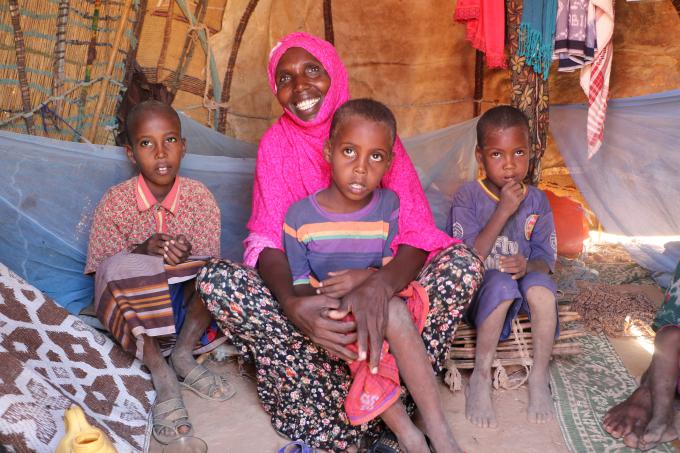We Cannot Reclaim Our Previous Way of Life: Ardo’s Story
Ardo Mohammed Abdi, 35, is a mother of eight children who had to give up her pastoralist livelihood due to the recurrent drought in Ethiopia’s Somali region. Having lost all their 100 shoats, 40 camels and ten heads of cattle to the drought, the family walked some 25 kilometres to end up in a temporary settlement outside of Boholhagare, a small town in Adadle Woreda of Somali’s Shebelle zone. “All my livestock died before my eyes, but thank God I could take all my children out of our village alive,” Ardo said.
For the last seven months, Ardo and her family are staying in the settlement where over 900 households of internally displaced persons (IDPs) live in critical humanitarian situation. According to Ardo, the family received 40 kilograms of sorghum from WHP only once. They received supplementary food for malnourished children and pregnant and lactating women thrice, four sachets each time. Over all, Ardo laments that food is extremely scarce for the settlers in the IDP camp. “When I and my family fled our village seven months ago and came to Boholhagare, we hoped to receive enough support. But all we received over the months is a one-time food ration from WFP, which is 40 kilograms of sorghum. We also received only four sachets of supplementary nutrition. We do not have enough to eat, and life is really difficult here. Still, we are thankful to the community in Bolohagare. They sometimes provide us with food despite their meagre resources.
Ardo is also thankful to Save the Children particularly for its WASH support. “Save the Children gave me training on proper hygiene and sanitation practices. They fill all the water tanks they brought here with water for us to use for drinking, cooking and keeping clean. As a community volunteer, I mobilize the community to clean the latrines Save the Children built for us,” she said. Reflecting on the change after the WASH interventions, Ardo added, “Before, many people did not really care about hygiene and sanitation. But our hygiene and sanitation promotion has really worked to change many people’s perceptions and practices. Most people now regularly use water purifying chemicals to ensure that they use safe and clean drinking water. They keep their personal hygiene, and properly use the latrines.” Despite her limited means to sustain her family’s life at the IDP camp, Ardo seems to have nowhere to go. “I still plan to stay around. At least, my children now go to school. Besides, the drought is still prevailing, and we cannot reclaim our previous way of life even if we wanted to,” she said.
Funded by ECHO through IRC, Save the Children’s ECHO-ERM project has reached around 33,887 people in Kelafo and Adadle Woreda’s of Somali’s Shebelle zone though its emergency WASH response to improve access to clean and safe water for IDPs and host communities. For the last five months, the project has been providing water trucking services and WASH kits to its targets in these Woredas. As a result, IDPs and host communities have been able to use clean and safe water as per the standard during emergencies and they have improved their hygiene and sanitation practices.
 Ethiopia
Ethiopia 